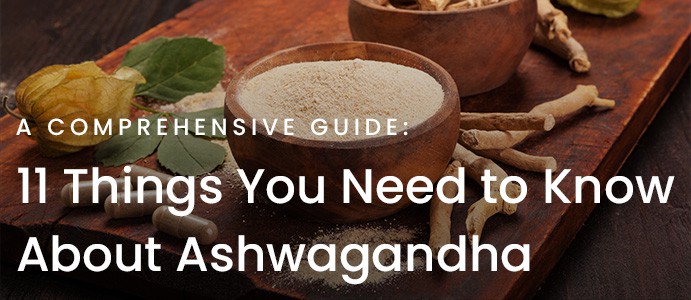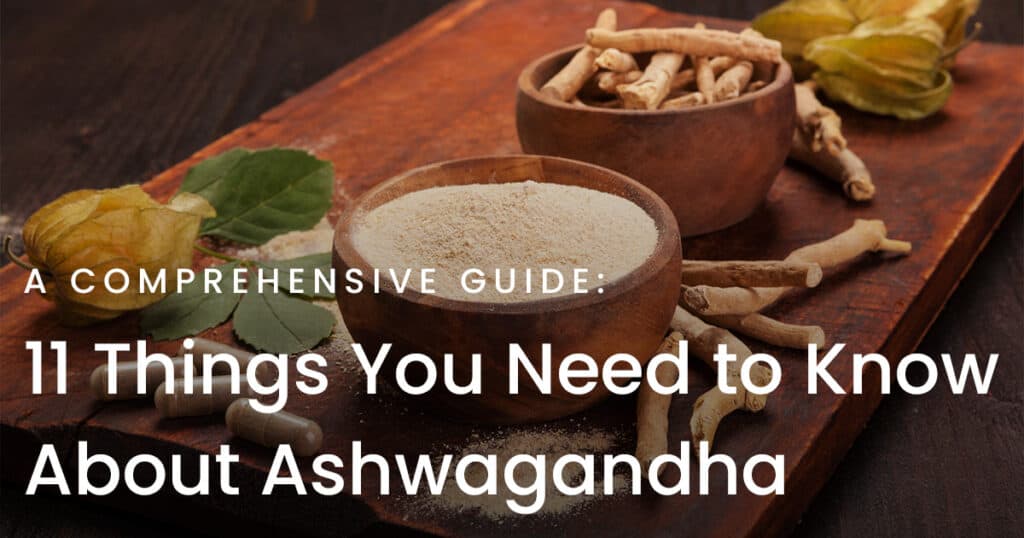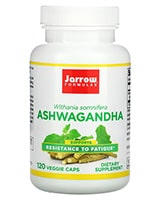

1. Introduction
Ashwagandha, a herb with a rich history, has been utilized for its various health benefits for centuries. From aiding in stress management to potentially enhancing brain health, Ashwagandha is a versatile herb that is increasingly recognized in the realm of natural health and wellness. This comprehensive guide will delve into the intriguing world of Ashwagandha, exploring its origins, potential benefits, uses, and more.
2. What is Ashwagandha and Where is it Found?
Ashwagandha, scientifically known as Withania somnifera, is a respected herb in Ayurvedic healing, a traditional Indian system of medicine. The name Ashwagandha, derived from Sanskrit, translates to “smell of horse,” symbolizing the herb’s supposed ability to impart the strength and vigour of a stallion.
This herb is native to India, Pakistan, and Sri Lanka, but its cultivation has now spread to other regions, including the United States. Ashwagandha belongs to the same family as the tomato and is a small woody shrub with oval leaves and five-petal yellow flowers. The fruit of the plant is red and about the size of a raisin, earning it the nickname “Winter Cherry.”
Ashwagandha is known for its potential stress-relieving properties. While it is effective in reducing stress and anxiety, it’s important to note that it may not be as potent as some prescription medications. Furthermore, some research suggests that Ashwagandha could have a protective effect on the central nervous system and might be a promising alternative treatment for a variety of degenerative brain diseases, including Alzheimer’s and Parkinson’s. However, more research is needed to confirm these potential benefits.
As an antioxidant, Ashwagandha may help to neutralize free radicals, which have been implicated in many age-related diseases. However, it’s not accurate to say that it specifically seeks out and destroys these free radicals. There’s also some emerging evidence that Ashwagandha might offer anti-cancer benefits, but more research is needed to substantiate these claims.
3. How Does Ashwagandha Work?
Ashwagandha is recognized as an adaptogen, which suggests it might assist the body in maintaining balance and adapting to stress. It’s believed to interact with the body’s neuroendocrine and immune systems, potentially helping to regulate critical physiological processes.

Ashwagandha has been studied for its potential influence on cortisol, the body’s primary stress hormone. Chronic stress can lead to elevated cortisol levels, which can have numerous negative effects on the body, including suppressing the immune system, promoting fat deposits, and damaging neurons in the brain. Some studies suggest that Ashwagandha might help to stabilize cortisol levels, but more research is needed to confirm this effect.
While Ashwagandha has been suggested to have calming effects, it’s important to note that it does not operate in the same way as prescription benzodiazepines like lorazepam. It may be beneficial in managing anxiety, but it’s not as potent as these medications.
Furthermore, some research suggests that Ashwagandha could help prevent and repair damage caused by neurodegenerative diseases like Alzheimer’s, Parkinson’s, and Huntington’s disease[1]Singh, N., Bhalla, M., de Jager, P., & Gilca, M. (2011). An overview on ashwagandha: a Rasayana (rejuvenator) of Ayurveda. African Journal of Traditional, Complementary and Alternative Medicines, 8(5S), thanks to its antioxidant and inflammation-reducing mechanisms. However, more research is needed to confirm these potential benefits.
4. The Potential Benefits of Ashwagandha
Ashwagandha may offer a wide range of benefits for both physical and mental health. Here are some of the potential benefits:
Stress Relief:
Ashwagandha is known for its potential stress-relieving properties. It may help to reduce cortisol levels and promote a sense of calm and well-being, although more research is needed to confirm this effect.
Improved Cognitive Function:
Ashwagandha may enhance cognitive function[2]Choudhary, D., Bhattacharyya, S., & Bose, S. (2017). Efficacy and Safety of Ashwagandha (Withania somnifera (L.) Dunal) Root Extract in Improving Memory and Cognitive Functions. Journal of Dietary Supplements, 14(6), 599–612. by optimizing mitochondrial function and increasing acetylcholine levels in the brain. This could lead to improved cognition and memory.
Anti-Anxiety and Antidepressant Properties:

Ashwagandha may help to alleviate symptoms of anxiety and depression[3]Chandrasekhar, K., Kapoor, J., & Anishetty, S. (2012). A prospective, randomized double-blind, placebo-controlled study of safety and efficacy of a high-concentration full-spectrum extract of Ashwagandha root in reducing stress and anxiety in adults. Indian Journal of Psychological Medicine, 34(3), 255–262.. It could restore self-confidence, improve speech fluidity, and reduce panic attacks.
Neuroprotection:
Ashwagandha may help to prevent and repair neuronal damage[4]Kuboyama, T., Tohda, C., & Komatsu, K. (2005). Neuritic regeneration and synaptic reconstruction induced by withanolide A. British Journal of Pharmacology, 144(7), 961–971., making it a potential treatment for neurodegenerative diseases. However, more research is needed to confirm these potential benefits.
Improved Energy Levels:
Ashwagandha may enhance overall energy levels[5]Lopresti, A. L., Smith, S. J., Malvi, H., & Kodgule, R. (2019). An investigation into the stress-relieving and pharmacological actions of an ashwagandha (Withania somnifera) extract: A randomized, double-blind, placebo-controlled study. Medicine, 98(37), e17186., potentially benefiting those suffering from chronic fatigue. However, more research is needed to confirm these potential benefits.
Potential Benefits for Men and Women:
Ashwagandha may have specific benefits for both men and women. For men, it could enhance virility and has been used as a natural treatment for infertility[6]Ahmad, M. K., Mahdi, A. A., Shukla, K. K., Islam, N., Rajender, S., Madhukar, D., Shankhwar, S. N., & Ahmad, S. (2010). Withania somnifera improves semen quality by regulating reproductive hormone levels and oxidative stress in seminal plasma of infertile males. Fertility and Sterility, 94(3), 989-996.. For women, it may help alleviate symptoms of menopause and can balance hormones[7]Gopal, S., Ajgaonkar, A., Kanchi, P., Kaundinya, A., Thakare, V., Chauhan, S., & Langade, D. (2021). Effect of an ashwagandha (Withania Somnifera) root extract on climacteric symptoms in women during perimenopause: A randomized, double-blind, placebo-controlled study. Journal of Obstetrics and Gynaecology Research, 47(12), 4414-4425.. However, more research is needed to confirm these potential benefits.
5. Forms of Ashwagandha: Powder, Tablets, and Gummies
Ashwagandha Powder:
Ashwagandha powder has a pungent, bitter flavour. It can be mixed with water, milk, or honey and consumed. It is often used in traditional Indian medicine. While it’s sometimes considered a potent form of Ashwagandha, the potency can vary depending on the specific product and dosage.
Ashwagandha Tablets/Capsules:
For many people, capsules are a preferred form as they allow for a precise dosage without the concern of taste or texture. They are made from pullulan, which is derived from a vegan starch known as amylose. They are easy to swallow, with zero aftertaste.
Ashwagandha Gummies:
Ashwagandha gummies offer many of the same benefits as Ashwagandha root capsules, but some people find them more convenient to take, especially if they struggle to swallow pills. Plus, they’re a delicious treat you’ll look forward to every day, making it easier to ensure you take them consistently. While some gummies are made with pectin, a type of soluble fibre, it’s important to note that not all Ashwagandha gummies are made this way. Some gummies are made with gelatin, which is a type of animal-based protein.
6. When and How to Take Ashwagandha
Best time to take Ashwagandha:
The best time to take Ashwagandha depends on the desired effects. For stress relief and improved sleep, it’s often recommended to take it in the evening. However, if you’re using Ashwagandha for its energy-boosting effects, taking it in the morning may be more beneficial.
Can Ashwagandha be taken without food?:
Ashwagandha can be taken with or without food. However, if you experience stomach upset after taking Ashwagandha, it may be beneficial to take it with a meal. It’s important to note that some people may experience stomach discomfort if they take Ashwagandha on an empty stomach.
7. Potential Side Effects and Who Should Be Cautious with Ashwagandha
Possible Side Effects of Ashwagandha
Like any supplement, Ashwagandha may have potential side effects. Some people may experience mild side effects such as upset stomach, diarrhea, and vomiting. While serious side effects like hormonal imbalances, thyroid dysfunction, and liver damage are possible, they are very rare and usually only occur in people who take very high doses of Ashwagandha for a long period. It’s important to consult with a healthcare provider before starting any new supplement regimen, especially if you have underlying health conditions or are taking other medications.
Who Should Be Cautious with Ashwagandha
Certain individuals should be cautious when considering taking Ashwagandha. This includes pregnant or breastfeeding women, as Ashwagandha may induce miscarriage or affect fetal development. People with autoimmune diseases, such as rheumatoid arthritis, lupus, or type 1 diabetes, should also be cautious as Ashwagandha can potentially stimulate the immune system and exacerbate these conditions. Additionally, individuals with thyroid disorders should use caution when taking Ashwagandha as it can alter thyroid hormone levels.
Can You Overdose on Ashwagandha?
While Ashwagandha is generally considered safe when taken in recommended doses, an overdose can lead to serious health complications. Symptoms of an Ashwagandha overdose may include severe stomach upset, diarrhea, vomiting, drowsiness, slow pulse, low blood pressure, and even coma in severe cases. If you suspect an overdose, seek immediate medical attention.
8. Ashwagandha and Sleep
Will Ashwagandha Make You Sleepy?
Ashwagandha is known for its stress-relieving properties, which can promote relaxation and improve sleep quality. However, it does not typically cause drowsiness or sleepiness during the day. Its effects on sleep are more about improving the quality of sleep rather than inducing sleepiness.
Can Ashwagandha Make You Tired?
While Ashwagandha is not typically associated with causing fatigue, individual responses can vary. Some people may experience feelings of relaxation or calmness that could be interpreted as tiredness. If you find that Ashwagandha is making you feel tired or lethargic, it may be worth adjusting your dosage or the timing of your dosage.
Ashwagandha for Sleep

Ashwagandha can be beneficial for improving sleep quality due to its adaptogenic and anxiolytic properties. It helps to regulate the body’s stress response, which can promote relaxation and make it easier to fall asleep and stay asleep. Some research suggests that Ashwagandha may also increase the body’s production of melatonin, a hormone that regulates sleep-wake cycles.”
9. Ashwagandha and Cortisol
How Ashwagandha Helps to Lower Cortisol
Ashwagandha is known for its adaptogenic properties, which means it can help the body manage stress. One of the ways it does this is by regulating the production of cortisol, the body’s primary stress hormone. When we’re under chronic stress, our bodies can produce too much cortisol, leading to various health issues such as anxiety, insomnia, weight gain, and heart disease. Ashwagandha can help to balance cortisol levels, reducing the negative effects of stress on the body.
10. Ashwagandha vs. Other Supplements
Comparison of Ashwagandha and Tongkat Ali
Ashwagandha and Tongkat Ali are both powerful herbs with a range of health benefits. Here’s a comparison of the two:
Tongkat Ali:
- Known for its testosterone-boosting properties, enhancing sexual health, muscle growth, and overall vitality[8]Henkel, R. R., Wang, R., Bassett, S. H., Chen, T., Liu, N., Zhu, Y., & Tambi, M. I. (2014). Tongkat Ali as a potential herbal supplement for physically active male and female seniors–a pilot study. Phytotherapy Research, 28(4), 544-550..
- Can improve mood, reduce stress, and increase energy levels.
- Offers immune system-boosting capabilities, anti-cancer properties, and the ability to lower blood sugar and pressure.
- However, it may cause side effects like insomnia, irritability, and restlessness, especially at high doses. The quality of Tongkat Ali can vary depending on the source or manufacturer, which may affect its efficacy and safety.
Ashwagandha:
- An adaptogenic herb that helps the body cope with various stressors, reducing cortisol levels and effectively managing anxiety and stress.
- Demonstrates potential in improving cognitive function, including memory and focus, due to its antioxidant properties that protect brain cells from oxidative stress.
- Supports the immune system and alleviates symptoms of chronic inflammatory conditions due to its anti-inflammatory properties.
- Enhances athletic performance by improving strength, endurance, and muscle recovery. Some studies indicate that it can promote reproductive health, particularly in men, by increasing sperm count and motility, while also improving sexual function in women.
- However, some individuals may experience side effects such as gastrointestinal issues, headaches, and drowsiness. It may stimulate thyroid hormone production in some individuals, leading to increased thyroid hormone levels that can be problematic for those with pre-existing thyroid disorders. It may also interact with certain medications, potentially causing adverse effects or reducing the effectiveness of these drugs.
Combining Tongkat Ali and Ashwagandha:
- You can take Tongkat Ali and Ashwagandha together to boost your daily energy needs and to keep an optimal hormonal balance. There have been no studies to show any adverse effects of combining these two herbs.
- However, if you are taking both herbs together, it is advisable to take them in small doses to allow your body to adjust to the bioactive ingredients.
- The best Tongkat Ali Ashwagandha combo are Physta® Tongkat Ali and KSM-66® Ashwagandha. Both are backed by numerous clinical trials and are considered safe and potent.
Please note that while these herbs have many potential benefits, they should be used responsibly and under the supervision of a healthcare provider, especially if you have any pre-existing conditions or are taking other medications.
11. Ashwagandha and Lifestyle
Ashwagandha and Alcohol
Ashwagandha and alcohol can be mixed due to the herb’s anti-anxiety effects, which can enhance the relaxing effects of alcohol. This can be beneficial for those who want to maintain a relaxed and pleasant mood while limiting their alcohol intake. Some individuals have reported a decreased urge to continue drinking alcohol when they take Ashwagandha before starting to drink. Based on these observations, there doesn’t appear to be any negative interaction between the two, and positive results are often experienced when mixing them. Ashwagandha has also been shown to help reduce anxiety and depression during alcohol withdrawal. In one study, its anti-anxiety effects were found to be similar to diazepam, a common anti-anxiety medication.
If you experience anxiety and depression after drinking alcohol, it is recommended to take Ashwagandha the following morning. It can help manage and alleviate symptoms of alcohol withdrawal more easily. Ashwagandha and Alcohol were found to ease alcohol withdrawal anxiety in a dose-dependent manner, similar to the herb Shilajit. These herbs, either alone or in combination, also reduced ethanol intake and increased water intake, particularly after 21 days of chronic administration. These central nervous system-engaging herbs, either alone or in combination, reduced both alcohol dependence and withdrawal, thus showing promising anti-addictive potential.
Is Ashwagandha Like Weed?
While Ashwagandha and cannabis are different plants, they share some similar properties. Both have been used for their stress-relieving and mood-enhancing effects. Cannabis has some of the key attributes of an adaptogen, thanks to its effects on the body through the endocannabinoid system. Anecdotal evidence suggests that combining weed with other adaptogenic herbs, oils, and fungi can enhance the effect of the two. Ashwagandha, also known as Indian ginseng, is a plant in the nightshade family. It’s been studied as a promising alternative treatment for anxiety. This is, of course, one of the main uses of cannabis. THC has been shown to reduce anxiety in low doses. And CBD? In studies, it’s helped lower anxiety in all doses. Mixed with Ashwagandha, those properties are heightened, leading to some major bliss.
12. Conclusion
In this article, we’ve covered a lot of ground about Ashwagandha, from its origins and benefits to its potential side effects and comparisons with other supplements. We’ve also discussed its various forms and the best ways to take it, as well as its interactions with alcohol and its similarities to weed.
If you’re looking for a natural way to manage stress, improve your sleep, or boost your overall health, Ashwagandha might be worth a try. However, as with any supplement, it’s important to use it responsibly and consult with a healthcare professional before starting a new regimen. Whether you choose to take it in the form of a powder, tablet, or gummy, Ashwagandha could be a valuable addition to your wellness routine.
Buy Ashwagandha Online Review Comparison Table
| Product | Company | Quantity | Price | Country | Website |
 Ashwagandha | iHerb | 120 pills (300mg) | $13.74 |  Worldwide, AU | Visit Website >> |
References

Leave a Reply